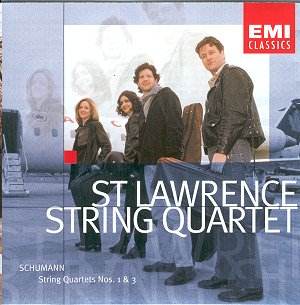Robert
SCHUMANN (1810-1856)
String Quartet no 1 in A minor, opus 41 no. 1
String Quartet no. 3 in A major, opus 41 no. 3
 St Lawrence String Quartet
St Lawrence String Quartet
Rec 23, 24 & 30 November, & 1 December 1998, New York
 EMI CLASSICS CDC5 56797
2 [59.05]
EMI CLASSICS CDC5 56797
2 [59.05]
Crotchet

By the time he turned to chamber music in 1842, Schumann was an extremely
experienced composer, particularly of piano music. And aside from the three
string quartets of opus 41, all Schumann's chamber music output retains a
role for the piano, his own instrument (and that of his wife Clara). But
these quartets are masterpieces of the first order, which reveal Schumann
at the height of his powers, and they deserve a wider currency.
This is the repertoire the St Lawrence Quartet have chosen for their recording
debut. It is therefore a bold choice, and one for which we can be grateful.
The performances are first rate; the recorded sound too. These Canadian musicians
formed their ensemble more than ten years ago, so their performances are
seasoned, not raw. The insert note goes out of its way to make this point,
proclaiming these musicians never play 'a single phrase with anything less
than life-and-death urgency'. Perhaps. In any event the interpretations captured
here are certainly compelling, with flowing lines and beautifully natural
balances, an ideal combination in early romantic music of this kind.
There is nothing to choose between the two works featured here, as far as
musical inventiveness is concerned. Perhaps the A minor has the greater
intensity, the A major the greater lyricism. But in truth each has its own
integrity within a structural design which inherits the classical four-movement
formula, while allowing that new intensity of feeling which marked the romantic
movement. The players convey this duality in their performances, which are
eloquent and, when necessary, intensely expressive.
This repertoire is not widely recorded, and there is surely no better combination
of performance and sound available today than this CD from the St Lawrence
Quartet. However, rival versions can be more generous. For example, the Eroica
Quartet on Harmonia Mundi (HMU90 7270) fit all three quartets of opus 41
on to a single 80-minute CD, an extra 20 minutes of music. So the question
to ask the St Lawrence Quartet is direct and compelling: were all your repeats
really necessary?
Terry Barfoot

